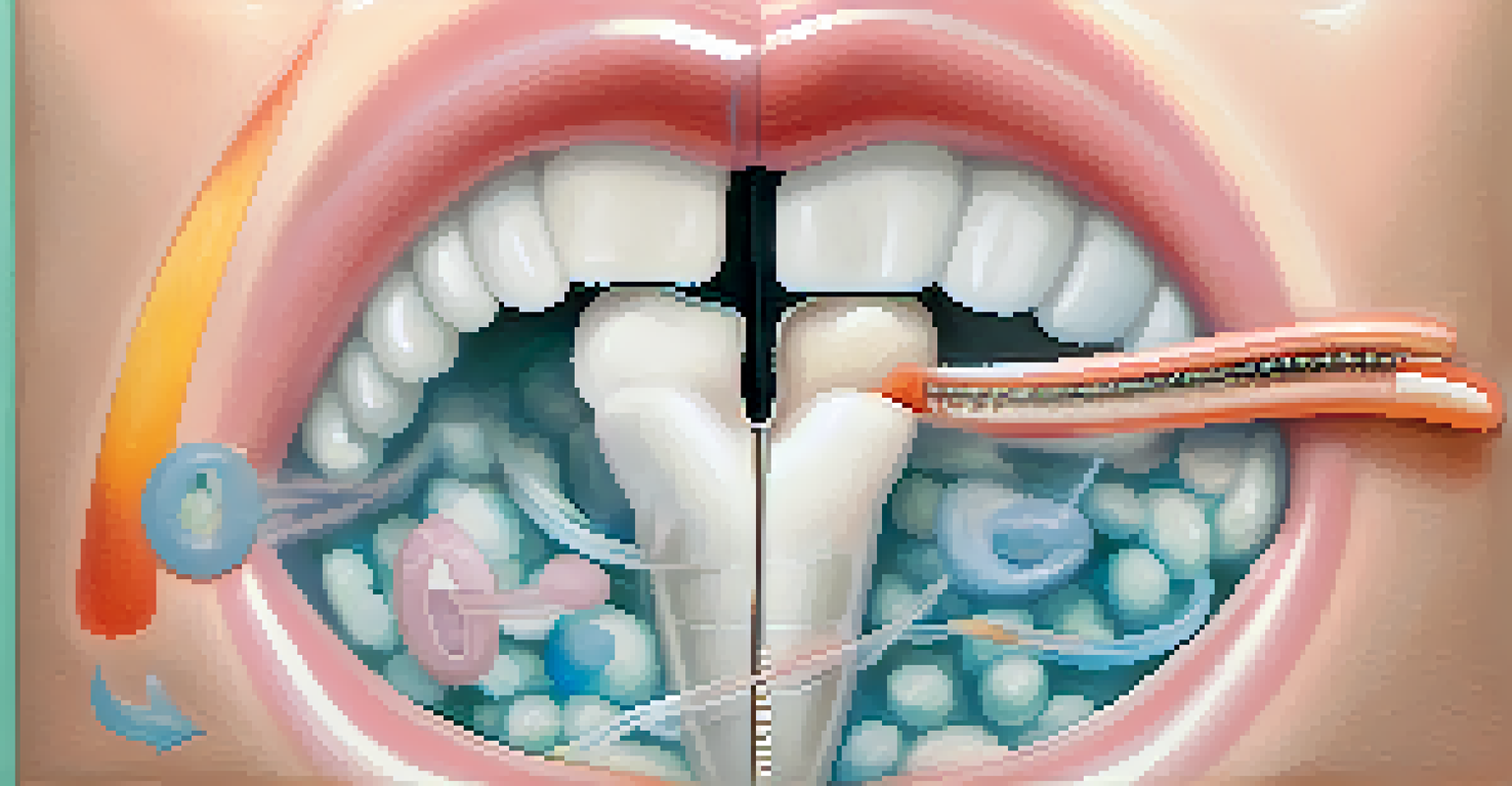The Link Between Oral Health and Respiratory Infections

The Importance of Oral Health for Overall Wellness
Oral health is often viewed as a separate entity from overall health, but that's a misconception. The mouth serves as a gateway to the body, and poor oral hygiene can lead to systemic issues. Just as we care for our teeth and gums, we must recognize that oral health is intertwined with our overall well-being.
The mouth is the gateway to the body, and maintaining its health is essential for overall well-being.
Studies have shown that bacteria from the mouth can enter the bloodstream, potentially affecting various organs. This connection highlights the importance of maintaining good oral hygiene practices. Simple habits, like regular brushing and flossing, can significantly impact your overall health.
By prioritizing oral health, we not only protect our smiles but also support our immune system. A healthy mouth can help the body fend off infections more effectively, making it a crucial aspect of health that often goes overlooked.
How Oral Bacteria Can Affect Respiratory Health
Bacteria in the mouth can travel through the airways and reach the lungs, which may lead to respiratory infections. This is particularly concerning for individuals with pre-existing respiratory conditions, such as asthma or chronic obstructive pulmonary disease (COPD). The impact of oral bacteria can be more pronounced in these individuals, potentially exacerbating their symptoms.

For instance, a study found that people with periodontal disease were at a higher risk of developing pneumonia. This link underscores the importance of maintaining good oral hygiene to reduce the risk of respiratory issues. By keeping the mouth clean, we can minimize the chances of harmful bacteria reaching the lungs.
Oral Health Affects Overall Wellness
Good oral hygiene is crucial for preventing systemic issues and supporting overall health.
This connection serves as a reminder that our bodies are interconnected. Taking care of our oral health isn't just about avoiding cavities; it's also about safeguarding our respiratory system and overall health.
The Role of Saliva in Oral and Respiratory Health
Saliva plays a crucial role in maintaining both oral and respiratory health. It helps wash away food particles and bacteria, providing a natural defense against infections. Additionally, saliva contains antimicrobial properties that can neutralize harmful pathogens before they enter the body.
Good oral health is key to good overall health.
A dry mouth, often caused by dehydration or certain medications, can lead to an increase in bacteria. This change can create a breeding ground for infections, making it essential to stay hydrated and maintain saliva production. Drinking water regularly and chewing sugar-free gum can help stimulate saliva flow.
Understanding the importance of saliva emphasizes why we should prioritize hydration and oral care. By doing so, we can help protect not just our mouths but our respiratory system as well.
The Impact of Smoking on Oral and Respiratory Health
Smoking is a significant risk factor for both poor oral health and respiratory infections. The harmful chemicals in tobacco can damage gum tissue, leading to periodontal disease, which elevates the risk of respiratory issues. Smokers are more likely to develop infections like bronchitis and pneumonia due to compromised oral health.
Moreover, smoking reduces the effectiveness of the immune system, making it harder for the body to fight off infections. The combination of oral bacteria and smoking can create a perfect storm for respiratory complications, emphasizing the need for smokers to consider quitting.
Bacteria Link to Respiratory Issues
Oral bacteria can travel to the lungs, increasing the risk of respiratory infections, especially in vulnerable individuals.
By understanding the risks associated with smoking, individuals can take proactive steps to improve both their oral and respiratory health. Quitting smoking can significantly enhance overall well-being and reduce the likelihood of infections.
Linking Gum Disease to Pneumonia and Other Infections
Emerging research has shown a strong link between gum disease and respiratory infections, particularly pneumonia. Gum disease can lead to inflammation, which may allow bacteria to enter the lungs more easily. This is especially concerning for vulnerable populations, such as the elderly or those with weakened immune systems.
In fact, individuals with chronic gum disease have been found to have higher rates of respiratory infections. This connection reinforces the need for regular dental check-ups and proper oral care to prevent gum disease. By addressing gum health, we can also protect against respiratory complications.
The link between oral and respiratory health highlights the importance of a comprehensive healthcare approach. A healthy mouth contributes to a healthy body, reducing the risk of serious infections.
Preventive Measures for Maintaining Oral and Respiratory Health
Preventive care is key in maintaining both oral and respiratory health. Regular dental visits for check-ups and cleanings can help identify and address issues before they escalate. This proactive approach ensures that both your teeth and gums remain healthy, ultimately benefiting your respiratory health.
Additionally, practicing good oral hygiene at home is essential. Brushing teeth twice a day, flossing daily, and using mouthwash can significantly reduce harmful bacteria in the mouth. These simple habits can help create a robust defense against infections.
Preventive Care Is Essential
Regular dental check-ups and good oral hygiene practices are vital for maintaining both oral and respiratory health.
Lastly, consider lifestyle choices that support both oral and respiratory health. Eating a balanced diet, exercising regularly, and avoiding smoking can contribute to overall well-being. By making these small changes, you can greatly impact your health.
The Importance of Awareness and Education
Raising awareness about the connection between oral health and respiratory infections is essential. Many people are unaware of how their oral hygiene can affect their overall health. Education on this topic can empower individuals to take charge of their health and prioritize dental care.
Healthcare providers play a crucial role in disseminating information about this link. By informing patients about the importance of oral health, they can encourage better hygiene practices and regular dental visits. This can lead to improved health outcomes and a reduction in respiratory infections.

Ultimately, fostering a culture of awareness regarding oral health can have far-reaching effects. By understanding the interconnectedness of our body systems, we can take proactive steps to maintain our health and prevent infections.